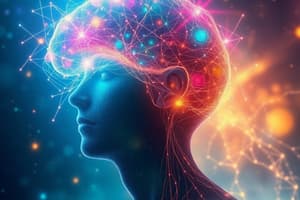Podcast
Questions and Answers
Which sense of self is primarily based on sensory input from the environment?
Which sense of self is primarily based on sensory input from the environment?
- Private Self
- Ecological Self (correct)
- Conceptual Self
- Interpersonal Self
What is the primary way that the interpersonal self is formed?
What is the primary way that the interpersonal self is formed?
- Through social interactions with others (correct)
- Through an autobiographical timeline
- Through reflection and understanding of others' beliefs and desires
- Through the development of theory of mind
At what stage of development does the extended self start to emerge?
At what stage of development does the extended self start to emerge?
- Adulthood
- Preschool years (correct)
- Infancy
- Adolescence
What is a key aspect of the private self that is unique to the individual?
What is a key aspect of the private self that is unique to the individual?
What is the primary influence on the conceptual self?
What is the primary influence on the conceptual self?
Which sense of self connects our current self to our past and future selves?
Which sense of self connects our current self to our past and future selves?
What is the primary way that the ecological self is developed?
What is the primary way that the ecological self is developed?
What is the primary aspect of the interpersonal self that is inherently social?
What is the primary aspect of the interpersonal self that is inherently social?
Which sense of self is closely linked to the development of theory of mind?
Which sense of self is closely linked to the development of theory of mind?
What is the primary way that the conceptual self is shaped?
What is the primary way that the conceptual self is shaped?
What is the primary objective of self-regulation?
What is the primary objective of self-regulation?
What is the primary function of the prefrontal cortex in self-regulation?
What is the primary function of the prefrontal cortex in self-regulation?
What is the term for the understanding that mental states can differ from person to person?
What is the term for the understanding that mental states can differ from person to person?
What is the primary purpose of the Smarties Task?
What is the primary purpose of the Smarties Task?
What is the term for the tendency to attribute others' behavior to internal, dispositional factors?
What is the term for the tendency to attribute others' behavior to internal, dispositional factors?
What is the primary difference between dispositional and situational factors?
What is the primary difference between dispositional and situational factors?
What is the primary function of the Sally-Anne Task?
What is the primary function of the Sally-Anne Task?
What is the term for explaining a person's behavior based on their unchanging, inner essence or characteristics?
What is the term for explaining a person's behavior based on their unchanging, inner essence or characteristics?
What is the primary purpose of attributions?
What is the primary purpose of attributions?
What is the primary influence on self-regulation skills?
What is the primary influence on self-regulation skills?
What is the primary role of biological factors in shaping gender development?
What is the primary role of biological factors in shaping gender development?
According to the study 'Gender Cognition in Transgender Children', what is a key conclusion drawn from the study's findings?
According to the study 'Gender Cognition in Transgender Children', what is a key conclusion drawn from the study's findings?
What is the primary function of the mirror test in assessing self-recognition in infants and young children?
What is the primary function of the mirror test in assessing self-recognition in infants and young children?
What is the term for our ability to control our emotions, impulses, and actions in various situations?
What is the term for our ability to control our emotions, impulses, and actions in various situations?
At what stage of life do children often exhibit very positive views of themselves, which may be unrealistic and exaggerated?
At what stage of life do children often exhibit very positive views of themselves, which may be unrealistic and exaggerated?
What is the term for our overall assessment of our own worth and the emotions attached to it?
What is the term for our overall assessment of our own worth and the emotions attached to it?
What is the primary role of cultural factors in shaping gender development?
What is the primary role of cultural factors in shaping gender development?
What is the term for the development of gender identity and gender constancy in children?
What is the term for the development of gender identity and gender constancy in children?
What is the primary characteristic of self-concept that encompasses both neutral facts and evaluations of different aspects of our identity?
What is the primary characteristic of self-concept that encompasses both neutral facts and evaluations of different aspects of our identity?
Flashcards are hidden until you start studying
Study Notes
Five Senses of Self
- Ecological Self: refers to our perception and movement awareness based on sensory input from the environment, allowing us to navigate and interact with our surroundings seamlessly.
- Interpersonal Self: formed through social interactions with others, developing automatically as we engage with the social world around us.
- Extended Self: connects our current self to our past and future selves, shaping our identity over time, developing during the preschool years and becoming more complex as we age.
- Private Self: includes experiences and knowledge unique to us, unless we choose to share them with others, emerging in later preschool years and closely linked to the development of theory of mind.
- Conceptual Self: based on the roles we play in society, including our perspectives, opinions, dreams, and goals, influenced by societal expectations and norms.
Delay of Gratification and Self-Regulation
- Delay of gratification is the ability to wait for a larger reward by resisting the temptation of an immediate reward.
- The marshmallow test is a famous experiment used to measure delay of gratification in children.
- Success in delaying gratification is associated with better self-regulation skills and long-term outcomes.
- Self-regulation is influenced by both biological maturation and contextual factors.
- Brain maturation, particularly the development of executive functions in the prefrontal cortex, plays a crucial role in self-regulation.
Theory of Mind
- Theory of mind refers to our understanding that mental states, such as beliefs, intentions, and desires, can differ from person to person.
- Theory of mind develops gradually during infancy and early childhood, enabling us to attribute mental states to others and understand their perspectives.
- Tasks such as the Smarties Task and Sally-Anne Task are used to assess children's understanding of false belief, demonstrating their developing theory of mind.
Attributions and Influences
- Attributions involve identifying the reasons behind certain behaviors, both in ourselves and others.
- Dispositional factors, such as intrinsic traits or characteristics, and situational factors, such as external circumstances or environmental influences, can influence attributions.
- The fundamental attribution error refers to the tendency to attribute others' behavior to internal, dispositional factors rather than external, situational factors.
- Essentialist bias involves explaining a person's behavior based on their unchanging, inner essence or characteristics.
Influences on Gender Development
- Biological factors, such as hormones present during prenatal development, play a significant role in shaping gender development.
- Cultural factors, including parental, peer, and media influences, provide different environments and expectations for boys and girls.
- Cognitive factors involve the development of gender identity and gender constancy, with children acquiring gender labels and understanding their gender identity at an early age.
Transgender Children
- A study titled "Gender Cognition in Transgender Children" explores the development of gender identity in transgender children.
- The study shows the complexity of gender identity development and emphasizes the importance of recognizing and supporting transgender children's gender identities.
Self-Concept
- Self-concept refers to our understanding of ourselves as separate and distinct beings.
- The mirror test is a classic method used to assess self-recognition in infants and young children.
- Passing the mirror test indicates an awareness of one's own reflection and is often considered a milestone in self-awareness development.
- Self-concept encompasses both neutral facts about ourselves and evaluations of different aspects of our identity.
Self-Esteem and Self-Regulation
- Self-esteem refers to our overall assessment of our own worth and the emotions attached to it.
- Self-esteem undergoes developmental changes across different stages of life.
- Self-regulation refers to our ability to control our emotions, impulses, and actions in various situations.
Studying That Suits You
Use AI to generate personalized quizzes and flashcards to suit your learning preferences.




